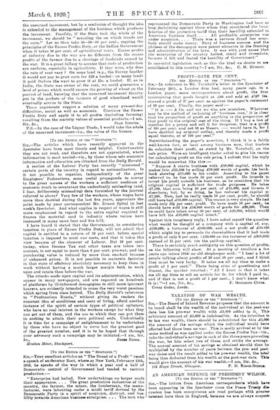PROFIT—RATE PER CENT.
[To THE EDITOR 07 THE " SPECTATOR."]
SIR,—In reference to Mr. Turnbull's letter in the Spectator of February 28th, a London firm bad, many years ago, in a London paper, some correspondence about profit, the firm maintaining that goods bought at .280 and sold at £127 10e. showed a profit of 37 per cent. as against the paper's statement of 59 per cent. Finally, the paper said :-
" It is — & Co. and not we who are mistaken. Whatever may be the method of reckoning of ' business men,' it is clear that the proportion of profit on anything is the proportion of that profit to the original cost of the thing. If I buy a box of matches for a penny and sell it for twopence, that is a profit of 100 per cent. and not 50 as Messrs. — would have it, for I have doubled my original outlay, and thereby made a profit equal thereto, or of 100 per cent."
Notwithstanding the paper's assertion, I think it is a fairly well-known fact, at least among business men, that traders do calculate their profit, as stated by Mr. Turnbull, on the sale price. Were an intelligent trader asked to give his reason for calculating profit on the sale price, I submit that his reply would be somewhat like this :- "Suppose A starts business with 3210.000 capital, whioh he makes into .215,000 by selling £10,000 worth of goods, his bank- book showing £15,000 to his credit. According to the paper referred to, he has made 50 per cent. profit. He intends to invest his profit outside his business, as he considers that his original capital is sufficient for trade purposes. Hs takes £ 7,500, that sum being 50 per cent. of £15,000, and invests it elsewhere; but, by so doing, he has reduced hie capital to £7,500. Now, had he really made 50 per cent. profit, he should still have had £10,000 capital. The reason is very simple. He had made only 331 per cent. profit. To have made 50 per cent., he should have sold his £10,000 worth of goods for X20,000. Then he could have taken away 50 per oent. of .220,000, which would have left his £10,000 capital intact."
Against this imaginary reply, I have asked myself the question what would be thought of a company with a capital of, say, £ 200,080, a turnover of £500,000, and a net profit of £30.000 which might try to persuade its shareholders that it had made a profit of only 6 per cent. (30,000 on the turnover of £500,000) instead of 15 per cent. (on the paid-up capital).
There is certainly much ambiguity on this question of profits, as the following will show. At a meeting of retailers a few years ago (since 1914) an old shopkeeper said : " I hear a lot of people talking about profits of SO and 50 per cent., and I think they must be very lucky. It takes me all my time to make a profit of 1 per cent." There being cries of questioning and dissent, the speaker retorted : " All I know is that it takes me all my time to sell an article for 2s. for which I paid is., and if that is not a profit of 1 per cent., I don't know what










































 Previous page
Previous page